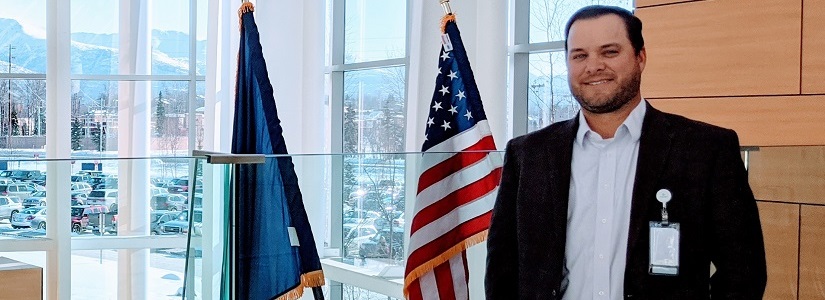By Zach Driver | April 6, 2020
Health care and the way we treat patients is at the forefront of most people’s minds during the COVID-19 pandemic that is affecting millions of people across the world. But, for Matthew Witt, it’s something that he has thought about every day for the past several years because of his work in health care technology.
Witt graduated from the College of Engineering and Computing’s Master of Health Information Technology program in 2018. He previously worked for Prisma Health in Columbia, but he now works for the Cerner Corporation as a population health strategy executive, overseeing a $10 billion health care delivery and deployment project involving the VA and U.S. Department of Defense, which is the largest project of its kind in the world.
We sat down with Witt, who is a veteran himself, to talk about his role in health care and what the University of South Carolina meant to him.
1) What was the most important thing you learned at the University of South Carolina, and how does that impact your job today?
The most important thing I learned in my graduate studies at the University of South Carolina was how passionate I was about health care delivery and my choice of being a servant for the greater good. There was quite a long period in my transition from high school to college where I was not sure what it was I was being called to do. That led to my decision to enter the military and serving in the U.S. Army Reserves from 1995 until 2001. I was active duty for almost two years as I trained to be a combat medic and then a laboratory technician.
2) What made you want to come to UofSC and pursue the M.H.I.T degree?
Having been a lifelong Gamecock fan, it only made sense for me to apply to the university that I grew up wanting to be a part of. Born in a military family, in a military town (Sumter), it was only fitting that I become part of the Gamecock nation.
3) What excites you about the future of your industry?
The future of the health care industry has been at a pivotal point for some time. We have seen many strides made in the improvement of health care delivery as well as the focus on the reduction in costs of that care delivery. The last two decades has seen health care turned on its head with the electronic medical record and sharing of data to improve outcomes. We have seen telemedicine utilization skyrocket due to access to care, lack of specialties and cost containment. Just recently, the COVID-19 pandemic has forced us into a new way of working, living and delivering care. The most exciting thing about the future of health care technology is the strides we will continue to make with these incredible lessons learned in these most trying times.
4) How would you define the intersection of the technology and health care industries?
I would define the intersection of technology and the health care industry as a critical element in this paradigm shift we are witnessing. We have plenty of tools in the technology belt now with big data, analytics, EHRs, agnostic platforms and telemedicine. The intersection or shift is how best we use these tools to improve outcomes, drive down costs, and enhance the patient experience. Technology is not the answer to healthcare delivery. It is only one of the tools (albeit a very large one) that we can leverage. Other considerations should revolve around change management and adoption/buy-in from front line service members. These are key considerations as any industry can have the best technology ever created, but we need our end users to buy into and adopt this technology to benefit the patient we have the privilege to serve.
The questions we should continue to be asking and answering is how are we best able to keep people out of the acute care setting? How can we continue to be proactive in the health and wellness of populations? How do we incentivize patients to become active consumers in their shared well-being?
5) What advice would you give to someone graduating from the CEC?
The advice I would give to any student that is looking at graduating soon is simply to never settle. Find something that you are extremely passionate about and go do that, career-wise. Find what fills your cup both personally and professionally. Love what you do, do what you love!
6) Anything else that you would want people to know about your job or health care technology?
As a veteran and accomplished servant health IT leader in complex organizations, I have demonstrated progressive leadership experience for over two decades and have certainly gotten to do what I love. My passion for people allows me to foster relationships, build trust and collaborate with every stakeholder within the health care landscape. Leaving health care better than when I found it 20 something years ago, that is absolutely my jet fuel.
